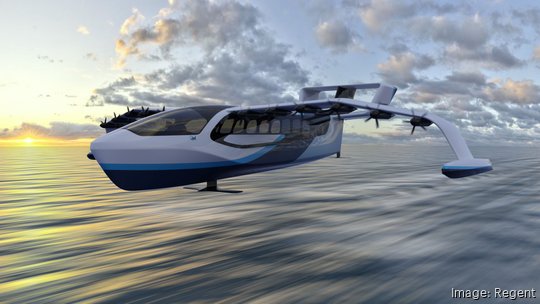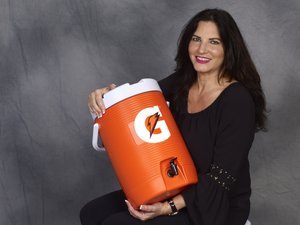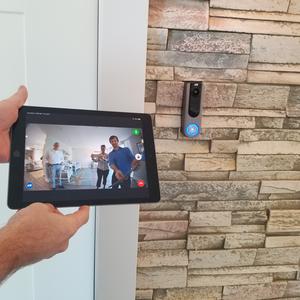
Would you commute to work via boat? How about on a seaglider?
A startup aims to bring that option to South Floridians before the end of the decade.
Rhode Island-based Regent partnered with Surf Air Mobility (NYSE: SRFM) to establish a local base for its electric seaglider operation. With a range of 180 miles per trip, the transportation service would include routes from Miami, Fort Lauderdale, Palm Beach and the Caribbean islands.
Trending: World's first chief heat officer on how businesses can manage risks of extreme heat
The goal is to bring an emissions-free travel option to coastal communities across the U.S., starting with Florida.
"We're imagining a network of affordable, high-speed transport over waterways comparable to a high speed train," Regent co-founder and CEO Billy Thalheimer told the Business Journal.
He said he expects a trip will be "half the cost of an airplane ticket" on comparable routes but did not specify a price range.
Regent's electric seaglider is a cross between a boat and plane. It floats at docks and harbors and then, as the craft gains speed, the hull lifts out of the water. That reduces drag and allows for higher travel speeds on open water.
The first model of the seaglider, still under development, will have space for 12 people per trip. Thalheimer expects the vehicle will be transporting passengers by 2025. The company aims to release a larger vessel that can carry up to 100 passengers by 2030.
"As battery technology improves, our travel range will also grow," Thalheimer said. "We expect to be able to complete 400 to 500 mile routes by the end of the decade."
It's an idea that's piqued the interest of investors. This month Regent raised $60 million to develop and test a proof of concept of its seaglider prototype. The series A round was led by 8090 Industries and the venture capital firm Founders Fund led by Peter Thiel. Thalheimer said the startup has received almost 500 orders from commercial customers across six continents.
The idea behind Regent emerged from Thalheimer and co-founder Michael Kilnker's background in electric aviation. The pair worked at Aurora Flight Sciences, a Boeing subsidiary researching autonomous and electric aviation, before launching the startup.
Read more: Inno under 25: Meet 10 of South Florida's young leaders
But electric aviation isn't an easy field to compete in, especially as a young company. The certification process, for example, can take about 10 years and cost tens of millions of dollars.
Nature inspired the pivot to electric seagliders, Thalheimer said. After observing the way pelicans can glide right over the surface of open water, the idea hit him.
"They use the air around them efficiently and that makes their flight look easy," he said. "I thought, what if we apply that to an aircraft to make it fly like a pelican?"
A seaglider is a class of vehicle known as a wing-in-ground effect vehicle, which falls under maritime jurisdiction. The certification process is faster under maritime law, a benefit for Regent as it works to bring its craft to market.
"There's still a high bar of safety to meet, but it gives us an edge because we won't have to wait in line behind 100 different electric aircraft companies," Thalheimer said.
Regent reports its Miami-based seaglider operation could eventually move as many as 1.5 million passengers per year, with transportation hubs slated for high-volume locations such as Miami International Airport and PortMiami. The startup plans to bring its seagliders to other coastal parts of the U.S. as well, including New England, California and Hawaii.
Related: Doroni Aerospace completes manned test flight of flying car
The innovation is just one way Miami-Dade County aims to develop transportation solutions to serve the region's fast-growing population, said Oliver Gilbert, chairman of the board of county commissioners.
"Adding seagliders into our network of advanced mobility technologies will grow our state and local economies and serve as a model for metropolitan transportation networks worldwide," he said in a statement.
For more stories like this one, sign up for Miami Inno newsletters from the South Florida Business Journal and the American Inno network.








